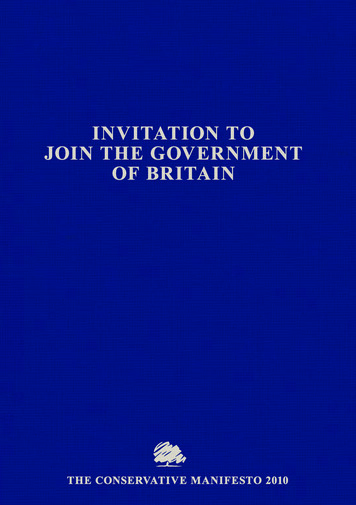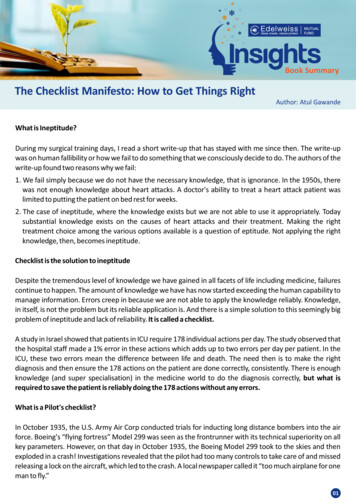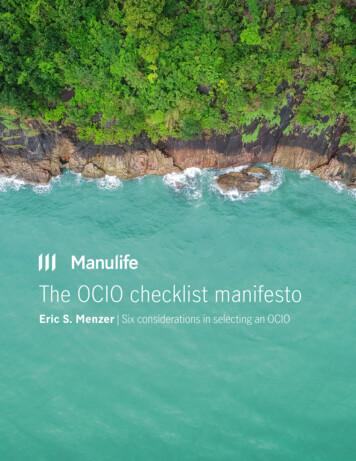
Transcription
INVITATION TOJOIN THE GOVERNMENTOF BRITAIN1THE CONSERVATIVE MANIFESTO 2010
INVITATION TOJOIN THE GOVERNMENTOF BRITAINT H E C ONSE RVAT I V E M A N I F E ST O 2 010
INVITATION TO JOIN THE GOVERNMENT OF BRITAINA country is at its best when the bonds between people are strong and when the sense ofnational purpose is clear. Today the challenges facing Britain are immense. Our economy isoverwhelmed by debt, our social fabric is frayed and our political system has betrayed the people.But these problems can be overcome if we pull together and work together. If we remember thatwe are all in this together.Some politicians say: ‘give us your vote and we will sort out all your problems’. We say:real change comes not from government alone. Real change comes when the people areinspired and mobilised, when millions of us are fired up to play a part in the nation’s future.Yes this is ambitious. Yes it is optimistic. But in the end all the Acts of Parliament, allthe new measures, all the new policy initiatives, are just politicians’ words without you andyour involvement.How will we deal with the debt crisis unless we understand that we are all in this together?How will we raise responsible children unless every adult plays their part? How will werevitalise communities unless people stop asking ‘who will fix this?’ and start asking ‘what canI do?’ Britain will change for the better when we all elect to take part, to take responsibility – ifwe all come together. Collective strength will overpower our problems.Only together can we can get rid of this government and, eventually, its debt. Only togethercan we get the economy moving. Only together can we protect the NHS. Improve our schools.Mend our broken society. Together we can even make politics and politicians work better. Andif we can do that, we can do anything. Yes, together we can do anything.So my invitation today is this: join us, to form a new kind of government for Britain.
CONTENTSInvitation to join the government of BritainiiiForewordviiChange the economyChange societyIntroduction3Benchmarks for Britain5Ensure macroeconomic stability7Create a more balanced economy11Get Britain working again15Encourage enterprise19Ensure the whole country shares inrising prosperity23Reform public services to deliverbetter value for money27Create a safer banking system thatserves the needs of the economy29Build a greener economy31Introduction35Build the Big Society37Make Britain the most familyfriendly country in Europe41Back the NHS45Raise standards in schools51Fight back against crime55iv
CONTENTSChange politicsProtect the environmentPromote our national interestIntroduction63Make politics more accountable65Make politics more transparent69Make politics more local73Restore our civil liberties79Strengthen the Union83Introduction89Combat climate change91Conserve and enhance the naturalenvironment95Introduction103Defend our security105A liberal Conservative foreign policy109An open and democratic Europe113One World Conservatism117This manifesto is available in braille, easyread, large print and audio.Please call 020 7222 9000 to request a copy, or visit our websitewww.conservatives.com.v
XX
FOREWORDBritain needs change: few can doubt that. Our national finances are mired in massive debt.Millions are living the misery of unemployment. Communities are shattered by crime and abuse.People in the public services are trapped in a web of rules and regulations. People have lost faiththat politics can fix our problems, or that politicians can lead us into a better future. There is afeeling of helplessness. Once again, there is a mood afoot that the decline of Britain is inevitable.But there is no law that says we must accept decline. We have the energy, the ideas and theambition to get Britain back on track. And that includes everyone in Britain, wherever they liveand whatever their circumstances. If we join together, if we act decisively, and move forward withoptimism, we can start to fix the economic, social and political problems that threaten the nation.We can bring about the change Britain needs.What is that change? Some promise solutions from on high – but real change comes fromcollective endeavour. So we offer a new approach: a change not just from one set of politicians toanother; from one set of policies to another. It is a change from one political philosophy to another.From the idea that the role of the state is to direct society and micro-manage public services, to theidea that the role of the state is to strengthen society and make public services serve the people whouse them. In a simple phrase, the change we offer is from big government to Big Society.This manifesto is the most important stage so far on a journey that began four and a half yearsago, when the Conservative Party itself voted for change by electing David Cameron as its leader.Since then, the Party has remoulded itself for the modern era, applying its deepest values andbeliefs to the urgent problems of the hour. Even as it has done so, the problems confronting Britainhave escalated, and escalated fast. So our ideas are ambitious and radical as well as modern. Theymatch the scale of Britain’s problems, and are in tune with a world that is changing before our eyes.But our core values have not altered and our core beliefs remain consistent.We believe in responsibility: government responsibility with public finances, personalresponsibility for our actions, and social responsibility towards each other. We believe in enterpriseand aspiration. We believe there is such a thing as society, it’s just not the same thing as the state.Our fundamental tenet is that power should be devolved from politicians to people, from the centralto the local. Personal ambition should be set as high as is humanly possible, with no barriers put inits way by the state. Perhaps most importantly, we believe that we are all in this together.Everything you will find in this manifesto is built on these beliefs. They are the building blocksof the change we want to see in every home, every street, every community, every business.vii
FOREWORDOur belief in responsibility with public finances is the starting point of our plan for economicrecovery and growth. We want your consent for a programme of public spending control that willdeal with Labour’s debt crisis and stop the Labour jobs tax that would kill our economic recovery.The programme set out in this manifesto is fully costed and fully funded. Some of our proposals –such as on school discipline – cost nothing, but require energy and leadership. Others – likestopping Labour’s jobs tax – will require money, and we will make savings in other areas to payfor them. The debt crisis is the terrible legacy that Gordon Brown is bequeathing to our country.But fiscal responsibility needs a social conscience or it is not responsible at all: so we will not allowthe poorest people in Britain to pay an unfair price for the mistakes of some of the richest.Nor will we allow irresponsibility in the private sector to continue unchecked. We will bringlaw and order to our financial markets as a necessary step to restoring confidence. But the realprize for Britain is to create a new economic model, one founded on investment and savings notborrowing and debt. This economic vision reflects our belief in enterprise and aspiration. It is avision of a truly modern economy: one that is greener and more local. An economy where Britainleads in science, technology and innovation. But it is founded on a determination that wealthand opportunity must be more fairly distributed. We want to see an economy where not just ourstandard of living, but everyone’s quality of life, rises steadily and sustainably.But a nation is only really successful if it is built on a strong society. We will never deal withour debts and build a new economy unless we solve the social problems that cost so much and holdso many people back. Labour’s big government approach is making our social problems worse, notbetter – inequality and poverty on the rise; social mobility stalled; family breakdown a factof life for too many children. So we need fundamental change: from big government that presumesto know best, to the Big Society that trusts in the people for ideas and innovation.We will move from state action to social action, encouraging social responsibility in all itsforms and across all the country – whether curbing incivility on our streets or supporting socialenterprises with the power to transform neighbourhoods. Mending Britain’s broken society willbe a central aim of the next Conservative government.That is why in this manifesto we set ourselves an ambitious goal: to make Britain the mostfamily-friendly country in Europe. That is why we back the NHS. That is why we will reformschools to raise standards and restore discipline. It is why we will get people off benefits and intowork; reform policing, sentencing and prisons. And why we are committed to a greener future.viii
FOREWORDBut we will not succeed in building the Big Society, or in building a new economic model,unless we stop government trying to direct everything from the centre. We will get nowhere withyet more top-down state control. So, after thirteen years of Labour, we need radical politicalreform. We need to change the whole way this country is run. As Conservatives, we trust people.We believe that if people are given more responsibility, they will behave more responsibly. Webelieve that if you decentralise power, you get better results and better value for money. So theplans set out in this manifesto represent an unprecedented redistribution of power and controlfrom the central to the local, from politicians and the bureaucracy to individuals, families andneighbourhoods.We will give people much more say over the things that affect their daily lives. We will makegovernment, politics and public services much more open and transparent. And we will give thepeople who work in our public services much greater responsibility. But in return, they will haveto answer to the people. All these measures will help restore trust in our broken political system.We know that this is an ambitious vision. A profoundly optimistic vision. It is also anauthentically Conservative vision: sound money, backing enterprise, trusting people. The journeywe embarked on four and a half years ago was all about applying this Conservative approachto the progressive challenges of our age: making opportunity more equal; fighting poverty andinequality; improving the environment and general well-being. So our creed today is progressiveConservatism; and this is an unashamedly progressive Conservative manifesto.Now we ask you to join us for the next and most important stage of the journey: changingBritain so we can offer a better life to all our citizens and play a proud and leading role in the world.Each of the three programmes of reform outlined in this manifesto – our plans to build a neweconomic model; to build the Big Society; to build a political system where people have morepower and control over their lives – is a massive undertaking in its own right. Yet we are proposingto carry out these changes all at once, because that is the only way to put Britain on the right pathfor a successful future.Britain faces huge problems that demand radical change; and it cannot come soon enough.We are impatient to get on with this work. We are determined to make a difference. We have thepolicies to make that difference. And most importantly, we have faith in the people of Britain,because we know that if we all pull together, stick together, then this country can change its future.ix
GlasgowGlasgow is the largest city in Scotland, and home to 13,000businesses, including some of Britain’s most successful firms. Forexample, eight of the ten largest insurance companies in the UK havean office in Glasgow, and the city is also home to leading technology,energy and creative businesses. Glasgow is the hub of an importantentrepreneurial sector, which includes innovative start-ups in fieldssuch as mobile telephony and computer games. Glasgow’s commercialstrength also extends to manufacturing, and the city continues to be aglobal leader in hi-tech ship building.
Change the economy
12
CHANGE THE ECONOMY INTRODUCTIONGet the economy movingGordon Brown’s debt, waste and taxes have wrecked the economy and threaten to kill therecovery. A Conservative government will take action now to cut the deficit, stop Labour’s jobstax, help keep mortgage rates low and get the economy moving. We will create a new economicmodel built on investment and savings, not borrowing and debt.Where is the growth going to come from? Who will provide jobs for the millions out of work?How will families be able to aspire to a better future? These are the questions being asked aboutBritain, at home and abroad.One thing is clear. We can’t go on with the old model of an economy built on debt. Irresponsiblepublic spending, an overblown banking sector, and unsustainable consumer borrowing on the backof a housing bubble were the features of an age of irresponsibility that left Britain badly exposed tothe economic crisis. Now, with the national debt already doubled and in danger of doubling again, itis this debt – together with the jobs tax that Labour will introduce to help pay for it – that threatensto kill the recovery.Britain needs a new economic model. Saving and business investment must replace recklessborrowing as the foundation of growth. We need to boost enterprise and develop a low carbon,hi-tech economy. Our exports must grow. We need to get Britain working by creating jobs in theprivate sector, and we must get better value for money from the public sector.With the next Conservative government, our tax system, education and national infrastructurewill help British firms out-compete their global rivals, not hold them back. We will build a morebalanced economy that does not depend so heavily on the success of financial services, and whereall parts of the country share in the gains. The bedrock of this new economic model will be thestability and low interest rates that come from a credible plan to reduce our record budget deficit,protect Britain’s credit rating and give taxpayers value for their money.Building this new economic model requires a national effort. We can reverse Britain’s economicdecline – but only if we accept that we are all in this together. No government, even a strong andunited one, can create a better country alone. It needs individuals, families and businesses pullingalongside. We want to unite everyone in our country behind this bold vision of a new Britisheconomic model.3
CHANGE THE ECONOMY BENCHMARKS FOR BRITAINBenchmarks for BritainFor the first time, the British people will have eight clear and transparent benchmarks againstwhich they can judge the economic success or failure of the next government. We will beaccountable and open. These are the eight Benchmarks for Britain. Achieving them over the nextParliament will mean we have put Britain back on its feet and are building a new British economicmodel, very different from the debt-driven economy of recent years.1. Ensure macroeconomic stability: We will safeguard Britain’s credit rating with a credible planto eliminate the bulk of the structural deficit over a Parliament. Our fiscal policy will seek tohelp keep interest rates lower for longer. The independent Bank of England will continue totarget 2 per cent Consumer Price Index (CPI) inflation, and will use its new role in prudentialsupervision to preserve financial stability.2. Create a more balanced economy: We will create the conditions for higher exports, businessinvestment and saving as a share of Gross Domestic Product (GDP).3. Get Britain working again: We will reduce youth unemployment and reduce the number ofchildren in workless households as part of our strategy for tackling poverty and inequality.4. Encourage enterprise: We will improve Britain’s international rankings for tax competitivenessand business regulation.5. Ensure the whole country shares in rising prosperity: We will increase the private sector’s shareof the economy in all regions of the country, especially outside London and the South East.6. Reform public services to deliver better value for money: We will raise productivity growthin the public sector in order to deliver better schools and a better NHS.7. Create a safer banking system that serves the needs of the economy: We will reform theregulation and structure of the banking system to ensure lower levels of leverage, lessdependence on unstable wholesale funding, and greater availability of credit for small andmedium-sized enterprises (SMEs).8. Build a greener economy: We will reduce UK greenhouse gas emissions and increase ourshare of global markets for low carbon technologies.5
6
CHANGE THE ECONOMY ENSURE MACROECONOMIC STABILITYEnsure macroeconomic stabilityWe will safeguard Britain’s credit rating with a credible plan to eliminate the bulk of the structuraldeficit over a Parliament. Our fiscal policy will help keep interest rates lower for longer. Theindependent Bank of England will continue to target 2 per cent CPI inflation, and will use its newrole in prudential supervision to preserve financial stability.After a decade of mismanagement, the UKentered the recession in poor shape, with thesecond biggest budget deficit in the developedworld. We have been honest about the scale ofthe problem, and the actions we will need totake to deal with it. This will not be easy, butwe can overcome our problems if we all pulltogether.We will increase spending on health in realterms every year and honour our commitmentson international aid, but our plan to get a gripon the deficit will include cuts to wastefulspending in many other departmental budgets.That will enable the independent Bank ofEngland to keep interest rates as low as possiblefor as long as possible.The absence of a credible plan to deal with ourrecord budget deficit, the largest of any majoreconomy, is creating uncertainty over Britain’scredit rating and interest rates. This instabilityundermines confidence and jeopardisesinvestment. It could tip Britain back intorecession. This is Gordon Brown’s legacy –and why the greatest risk to our economicrecovery is five more years of Gordon Brown.To ensure that no Labour government canever attempt to bankrupt our public financesagain, we will set up an independent Officefor Budget Responsibility to restore trust inthe government’s ability to manage the publicfinances.We will provide an emergency Budget within50 days of taking office to set out a credibleplan for eliminating the bulk of the structuralcurrent budget deficit over a Parliament. Thecase for starting early to re-establish oureconomic credibility is overwhelming, and isbacked by economists and business leaders.Urgent action to reduce debtUrgent action is needed if we are to avoid thehigher borrowing costs that would inevitablyfollow from a credit rating downgrade. Sowe will cut wasteful government spendingto bring the deficit down and restore stability.7
CHANGE THE ECONOMY ENSURE MACROECONOMIC STABILITYCut government waste to stopLabour’s jobs taxWe will start by cutting a net 6 billion ofwasteful departmental spending in the financialyear 2010/11. In addition, we will make thefollowing savings:Labour are planning to increase NationalInsurance in 2011. Anyone earning over 20,000 will pay more tax, and employerswill pay more tax on all jobs paid over 5,700.This jobs tax, which will hit small businessesespecially hard, will kill off the recovery.Experts predict it will cost 57,000 jobs in smalland medium-sized businesses alone. freeze public sector pay for one year in2011, excluding the one million lowest paidworkers; hold a review to bring forward the date atwhich the state pension age starts to rise to66, although it will not be sooner than 2016for men and 2020 for women;At the same time, Labour will not take action tocut waste in government. They have identified 11 billion pounds of waste, but they do notplan to start dealing with it until April 2011.So Labour will continue wasting money whileputting up taxes on working people. stop paying tax credits to better-off familieswith incomes over 50,000; cut government contributions to Child TrustFunds for all but the poorest third of familiesand families with disabled children;We will act immediately to cut governmentwaste so we can stop the most damaging part ofthe National Insurance rise for employers andfor anyone earning under 35,000. cap public sector pensions above 50,000; cut Ministers’ pay by 5 per cent, followed bya five year freeze; and,We will make the following changes in April2011, relative to Labour’s plans: reduce the number of MPs by 10 per cent.Over the course of a Parliament, we will cutWhitehall policy, funding and regulationcosts by a third, saving 2 billion a year, andsave a further 1 billion a year from quangobureaucracy. raise the primary threshold for NationalInsurance by 24 a week and raise the UpperEarnings Limit by 29 a week; and, raise the secondary threshold at whichemployers start paying National Insuranceby 21 a week.8
CHANGE THE ECONOMY ENSURE MACROECONOMIC STABILITYSeven out of ten working people – thoseearning between 7,100 and 45,400 – andalmost every employer will save up to 150a year per person compared to under Labour.Lower earners will get the greatest benefit asa percentage of their earnings. Nobody will beworse off as a result of these changes.the quality of frontline services. These areover and above any savings already planned byLabour. We will achieve this through: a freeze on major new Information andCommunications Technologies (ICT)spending; immediate negotiations to achieve costreductions from major suppliers;Our plans are backed by many of Britain’s topbusiness leaders, who between them employmore than half a million people, as well as byBritain’s leading business organisations. tighter control of public sector recruitment; reductions in discretionary spending,including travel, expenses, advertising,consultancy and office supplies; and,To pay for this we will take immediate actionto cut a net 6 billion of wasteful departmentalspending in the financial year 2010/11, withfurther savings in future years. This is inaddition to the savings made by cutting taxcredits and Child Trust Funds for betteroff families. reductions in public sector property costs.We will match Labour’s spending plans for2010/11 in health and overseas aid. Given ourcommitment to carry out a Strategic Defenceand Security Review, it would also not beappropriate to make in-year reductions to theexisting defence budget in 2010/11. Savingsin these protected areas will be channelledback into frontline services. The net 6 billionof savings will be made from the remainingdepartmental budgets.These actions will allow us to reduce thedeficit more quickly than Labour year-on-yearwhile avoiding the most damaging part oftheir jobs tax. It will also lower the proportionof the reduction of the structural deficit thatis accounted for by tax increases, from aboutone third towards one fifth. This is in linewith international best practice, as well as theTreasury’s own internal analysis.Former government advisers Sir Peter Gershonand Dr Martin Read have advised us thatsavings of 12 billion across all departmentalspending are possible in-year without affecting9
10
CHANGE THE ECONOMY CREATE A MORE BALANCED ECONOMYCreate a more balanced economyWe will create the conditions for higher exports, business investment and saving as a share of GDP.For the last decade, growth has been toodependent on government spending and debtfuelled consumption. More than half of the newjobs created were driven by public spending.Household savings collapsed, and the UK hasthe lowest investment as a share of GDP ofany G7 country. Our share of world exportshas fallen by almost a third. A sustainablerecovery must be driven by growth in exportsand business investment, and through a betterenvironment for wealth creation. creating a better focus on Science,Technology, Engineering and Maths(STEM) subjects in schools; and,Make Britain the leading hi-techexporter in EuropeWe will improve the performance of UKTrade and Investment with a renewed focuson high priority sectors and markets wherethe return on taxpayers’ money is highest. Wewill regularly compare government support forexporters and inward investment against theservices provided by our competitors. We willwork for the successful conclusion of the Dohatrade round and support bilateral free tradenegotiations between the European Union (EU)and other countries. establishing a new prize for engineering.Research and development tax credits will beimproved and refocused on hi-tech companies,small businesses and new start-ups. At thesame time, we will give strong backing to thegrowth industries that generate high-qualityjobs around the country.We will implement key recommendations fromSir James Dyson’s Review into how to achieveour goal of making Britain Europe’s leadinghi-tech exporter, including: encouraging the establishment ofjoint university-business research anddevelopment institutes; initiating a multi-year Science and ResearchBudget to provide a stable investment climatefor Research Councils;11
CHANGE THE ECONOMY CREATE A MORE BALANCED ECONOMYEncourage saving andinvestmentWe must not let the mis-selling of financialproducts put people off saving. We willimplement the Ombudsman’s recommendationto make fair and transparent payments toEquitable Life policy holders, through anindependent payment scheme, for their relativeloss as a consequence of regulatory failure.Only by saving more can we financeinvestment for the future without beingdependent on unsustainable inflows of capitalfrom abroad. We will help stop the spread ofmeans-testing by restoring the link betweenthe basic state pension and average earnings,making it worthwhile for people to save. Othermeasures we will take to encourage savinginclude:Help households manage theirdebtsGoing into the recession, Britain’s consumerdebt was the highest in the G7. A Conservativegovernment will promote responsible consumerfinance by creating a powerful ConsumerProtection Agency (CPA) to take over theFinancial Services Authority’s consumerprotection role. In addition, we will: reinvigorating occupational pensions andworking with employers and industry tosupport auto-enrolment into pensions; working with the trade unions, businessesand others to address the growing disparitybetween public sector pensions and privatesector pensions, while protecting accruedrights; and, give the CPA new powers to define and banexcessive borrowing rates on store cards; launch Britain’s first free national financialadvice service, funded in full through anew social responsibility levy on thefinancial services sector; when resources allow, starting to reverse theeffects of the abolition of the dividend taxcredit for pension funds. introduce a seven-day cooling off periodfor store cards;We will reward those who have saved fortheir retirement by ending the effectiveobligation to buy an annuity at age 75. Andwe will raise the inheritance tax thresholdto 1 million to help millions of people whoaspire to pass something on to their children,paid for by a simple flat-rate levy on allnon-domiciled individuals. require credit card companies to provideclear information; and, ensure that no-one is forced to sell theirhome to pay unsecured debts of lessthan 25,000.12
13
CHANGE THE ECONOMY ENSURE MACROECONOMIC STABILITYDebbie Scott“I’ve always believed that we’ll only solve our big social and economic problems if weall get involved and try and make a difference. It’s never enough just to sit back andthink ‘well the government can take care of it’ – I think we’ve all got a responsibilityto do what we can. That’s why every day, my colleagues and I use all the innovationand flexibility we can muster to help those furthest from the labour market toovercome their personal barriers to work. For me, it is all about believing in the powerof people. Tomorrow’s People welcomes the concept of the single Work Programme –it pulls everything together and allows organisations like ours to support people moreeffectively on their individual journey from welfare into work.”Debbie Scott is the Chief Executive of Tomorrow’s People, a national employment charity founded in 198414
CHANGE THE ECONOMY GET BRITAIN WORKING AGAINGet Britain working againWe will reduce youth unemployment and reduce the number of children in workless households aspart of our strategy for tackling poverty and inequality.Under Labour, youth unemployment hasreached over 900,000, with one in fiveyoung people unable to find a job. We are atrisk of creating a lost generation of youngpeople without the skills to participate in theworkforce, without hope for the future. At thesame time, economic inactivity is rising, andmore than five million people are out of workand on benefits.Benefit who do not get enough help fromexisting programmes. We will reassess allcurrent claimants of Incapacity Benefit.Those found fit for work will be transferredonto Jobseeker’s Allowance. Recipients ofIncapacity Benefit who are genuinely disabledwill continue to receive the financial support towhich they are entitled. Our Work Programmewill:This tidal wave of worklessness is making ithard for many families to make ends meet. Inrecent years, the number of people living insevere poverty has risen. One in six children inthe UK now lives in a workless household – thehighest proportion of any country in Europe –and child poverty has gone up in recent years.Getting people back into work is an essentialpart of realis
THE CONSERVATIVE MANIFESTO 2010 INVITATION TO JOIN THE GOVERNMENT OF BRITAIN. INVITATION TO JOIN THE GOVERNMENT OF BRITAIN THE CONSERVATIVE MANIFESTO 2010. INVITATION TO JOIN THE GOVERNMENT OF BRITAIN A country is at its best when the bonds between people are strong and when the sense of










